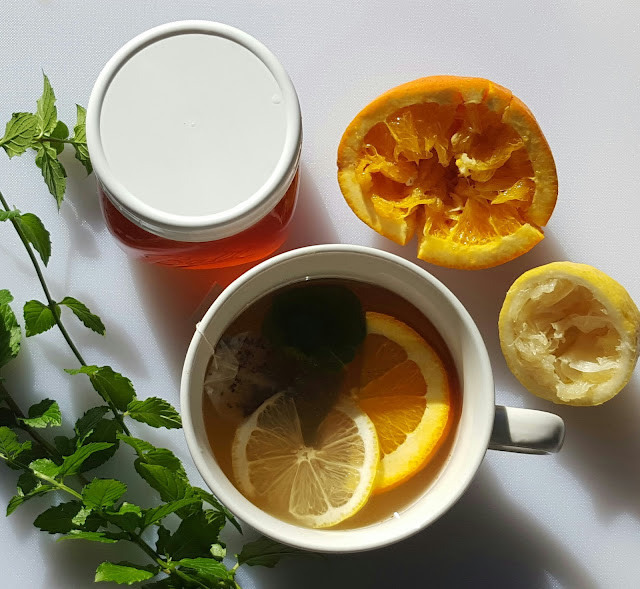Citrus and Mint Green Tea:
Steep a green tea bag in a cup of hot water. Squeeze in the juice of half of a lemon and half of an orange. Add 2-3 fresh mint leaves and honey to your preferred sweetness.
How much protein do you need each day? If you ask the advertisers for the food industry you need as much as you can shovel in your mouth in a day. There are so many ads on TV and food packaging boasting the extra protein added to this or that. The real answer is that there is some variation in the exact amount of protein that is required by humans depending on who you ask and what age group you are talking about. Growing children and endurance athletes likely need a little more protein and grandma likely needs a little less.
To make it more confusing, for the average healthy adult the WHO comes up with a number that is slightly different than the FAO, and that differs slightly from the USDA. But, they all estimate that for a healthy adult you need somewhere between 0.6g/kg/day and 0.8g/kg/day of protein. Since I live in the US, I am going to use the USDA's recommendation which is 0.8g of protein per kilogram of body weight per day for this discussion. So, take your weight in pounds and divided that by 2.2 to figure out how many kilograms you weigh, and then multiply that by 0.8g. That is how many grams of protein you need for the entire day.
Let's take a 150lb person as an example. 150lb divided by 2.2 kg/lb = 68kg. 68kg multiplied by 0.8 grams of protein/kg/day = 54g of protein per day.
There is one more piece to this puzzle, and that is regarding complete proteins. Proteins are made up of amino acids. Humans use 20 different amino acids to build proteins, 11 of these our bodies can make, and 9 are essential and need to come from foods (some sources will include arginine on the list of essential amino acids, but is only essential infancy).
The amounts of these essential amino acids that are required by adults each day are relatively small:
Histidine 8-12mg/day
Isoleucine 10mg/day
Leucine 14mg/day
Lysine 12mg/day
Methionine plus cystine 13mg/day
Phenylalanine plus tyrosine 14mg/day
Threonine 7mg/day
Tryptophan 3.5mg/day
Valine 10mg/day
We are talking milligrams here, not grams (there are 1,000 milligrams in a gram)!
(data from the National Research Council (US) Subcommittee on the Tenth Edition of the Recommended Dietary Allowances.)
Confused yet? Let's looks at this information in a more practical way.
Below is a sample day of 3 different diets. The typical American diet, a "healthy" animal based diet, and a plant based diet.
Typical American Diet
Breakfast:
|
Snack:
|
Lunch:
|
Snack:
|
Dinner:
|
2 eggs
3 strips bacon
2 slices white
toast
1 tbsp butter
OJ
|
Cupcake
Juice
|
Turkey sandwich
1 tbsp mayo
1 serving potato
chips
apple
|
Crackers and PB
Soda
|
6 oz steak
mashed potatoes
Green beans
Glass of milk
|
Calories: 2536 (FYI too many calories)
Protein: 130g
Essential amino acids requirement met: yes
Vitamin and mineral requirements met: no (under on iron, magnesium, potassium, vitamins A, D, E, and K)
"Healthy" Animal Based Diet
Breakfast:
|
Snack:
|
Lunch:
|
Snack:
|
Dinner:
|
Bowl of multigrain cereal
Skim milk
Orange
Coffee with creamer
|
Greek yogurt with fruit
Water
|
Salad with 4 oz grilled chicken
Walnuts
Low fat dressing
Serving of cheese
Pita bread
|
Apple and PB
|
3 oz white fish
rice
broccoli
carrots
glass of skim milk
piece of dark chocolate
|
Calories: 1945
Protein: 128g
Essential amino acids requirement met: yes
Vitamin and mineral requirements met: no (under on iron, potassium, vitamin D, and folate)
Wholefood Plant Based Diet (most recipes from this blog)
Breakfast:
|
Snack:
|
Lunch:
|
Snack:
|
Dinner:
|
2 slices toast with avocado and tomatoes
watermelon and honeydew melon
water with lemon
|
Apple with almond butter, granola, and raisins
|
Jimaca and black berry walnut salad
Balsamic dressing
Lemon Rosemary Soup
|
Hummus and pita chips
|
Grilled portabello mushrooms
Smokey quinoa
Roasted root veges
Almond milk
banana "ice cream"
|
Calories: 1957
Protein: 55g
Essential amino acids requirement met: yes
Vitamin and mineral requirements met: yes
Supertracker.usda.gov used to calculate nutrient values above.
Guys, guess what? You are probably eating way too much protein each day if you are following a typical American diet (way too many calories here too) or "healthy" animal based diet. More is not always better. In the case of protein and amino acids, when you eat too much your body does not store extra for later use in their original form. Extra protein is first burned as energy and if not needed is then turned into carbohydrates or fat for storage (not cool). There is also a decent amount of research out there that suggests that diets that are higher in protein encourage the growth of cancer cells and are implicated in obesity, heart disease, and diabetes. So why are we eating so much protein? Stop it! Please :)
I hope that this experiment was eye opening for you. If you run this experiment on your own diet, feel free to leave the results in the comments section.
Happy eating and best health,
Dr. G

No comments:
Post a Comment